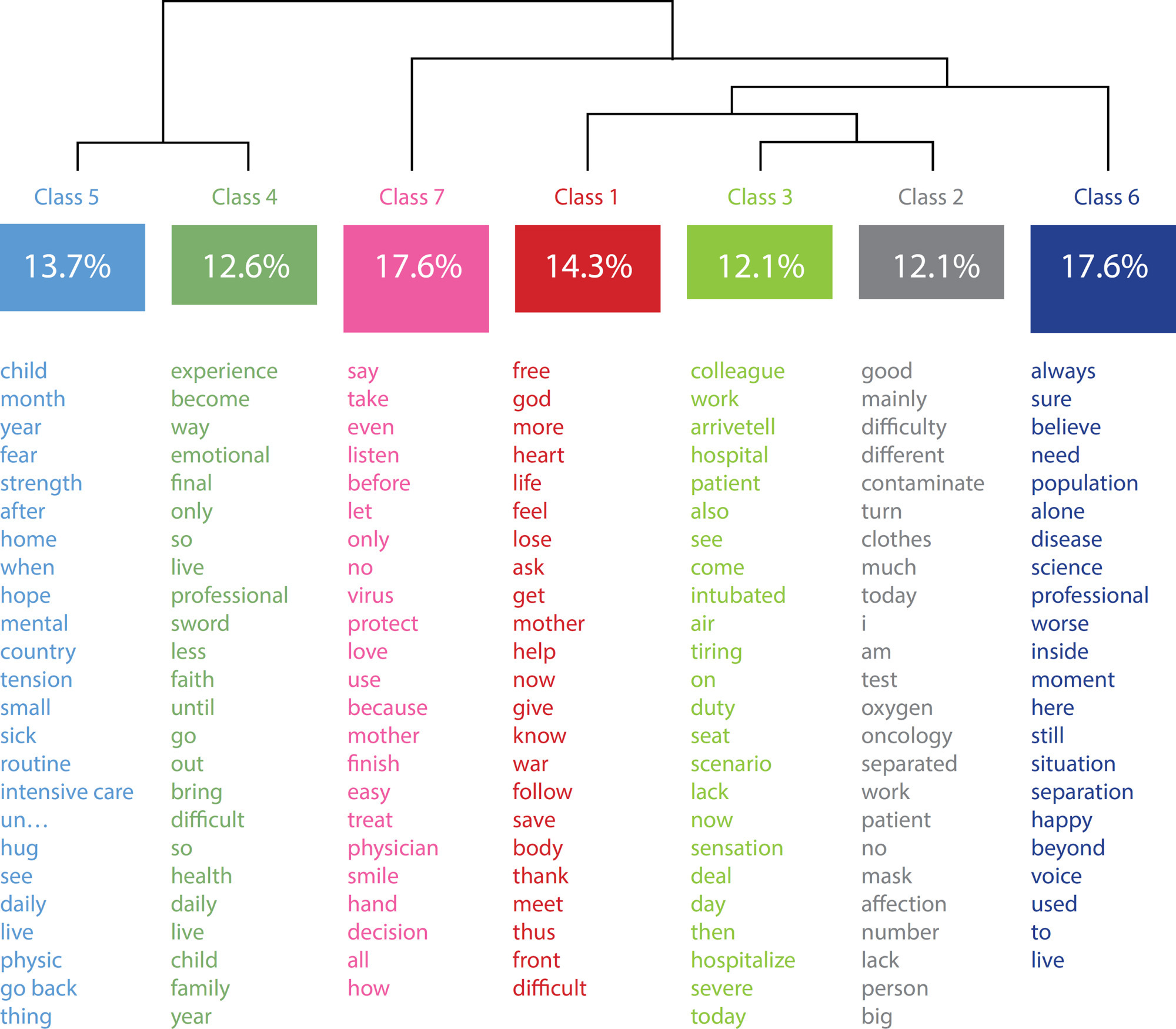-
ARTIGO ORIGINAL
COVID-19 Pandemic: health professionals’ perception about the assistance mentioned in television media
Revista Brasileira de Enfermagem. 2021;74(suppl 1):e20201258
05-21-2021
Resumo
ARTIGO ORIGINALCOVID-19 Pandemic: health professionals’ perception about the assistance mentioned in television media
Revista Brasileira de Enfermagem. 2021;74(suppl 1):e20201258
05-21-2021DOI 10.1590/0034-7167-2020-1258
Visualizações0Ver maisABSTRACT
Objective:
Exhibit the health professionals’ perception about the assistance provided during the COVID-19 pandemic mentioned television media.
Methods:
Qualitative study developed after analysis of the videos with a testimonial from practitioners assisting patients with COVID-19, presented by the series “Inside Here” (in Portuguese, “Aqui Dentro”), of Globo TV News Jornal Nacional, broadcasted in 2020. Textual data was processed by the software IRAMUTEQ with descending hierarchical classification and content analysis, having the theoretical framework as the psychodynamics of Dejours’ study.
Results:
Three categories emerged: work overload in assisting; subjective mobilization of health professionals; strategies to face in assisting.
Final considerations:
We verified the physical and psychic work overload during the assistance, but there was a concern to ensure a humanized care. Despite the difficulties faced, the recovery and discharge from patients generated motivation and satisfaction in front of the COVID-19 scenario.

-
RESEARCH
Patient participation in hand hygiene among health professionals
Revista Brasileira de Enfermagem. 2018;71(2):259-264
01-01-2018
Resumo
RESEARCHPatient participation in hand hygiene among health professionals
Revista Brasileira de Enfermagem. 2018;71(2):259-264
01-01-2018DOI 10.1590/0034-7167-2016-0124
Visualizações0ABSTRACT
Objective:
To investigate the perception and attitude of health professionals (HPs) about the patient participation in hand hygiene (HH).
Method:
A cross-sectional study with 150 HPs from a university hospital in Brazil. A descriptive analysis was conducted.
Results:
Simple hand hygiene was the preferred method of HPs, rather than hand rubbing with alcohol-based solutions. A total of 83.3% of the HPs supported the patient participation in reminding them about HH, but 48% reported that they would feel uncomfortable; 45.3%, comfortable; and 20.7% were familiar with the "Patients for Patient Safety" program.
Conclusion:
HPs showed limited knowledge about HH, opposing recommendations on the topic. The contradiction between the HPs acceptance and attitude when questioned by the patient regarding HH was revealed, reflecting a lack of knowledge about the WHO program and the need to implement educational practices in health.
Palavras-chave: Hand hygieneHealth ProfessionalsHospital InfectionPatient ParticipationPatient SafetyVer mais -
RESEARCH
Social Representations of health care professionals on Acquired Immune Deficiency Syndrome
Revista Brasileira de Enfermagem. 2018;71(4):1934-1939
01-01-2018
Resumo
RESEARCHSocial Representations of health care professionals on Acquired Immune Deficiency Syndrome
Revista Brasileira de Enfermagem. 2018;71(4):1934-1939
01-01-2018DOI 10.1590/0034-7167-2015-0001
Visualizações0Ver maisABSTRACT
Objective:
To apprehend social representation of health care professionals on HIV/AIDS and to compare it with a subgroup of physicians.
Method:
Qualitative research based on the Theory of Social Representations. Free associations for the term HIV/AIDS were collected from 73 workers of public services specialized in HIV/AIDS, in Salvador-Bahia. The results were analyzed in the EVOC software.
Results:
For all health professionals, HIV/AIDS is associated with “prejudice, care, disease and prevention”, and for the subgroup of physicians it is associated with the term “prevention”. Health professionals represented HIV/AIDS similarly to society in general and, due to their normative character, prescribed attitudes typical of health care professionals.
Final considerations:
The findings show that, despite the advances in the health area regarding the treatment of AIDS, prejudice still persists. It is important to strengthen interdisciplinary actions focused on discussions on this theme during training, favoring the comprehensiveness of the assistance.
-
PESQUISA
Post-accident work behavior in caring for people with HIV/Aids
Revista Brasileira de Enfermagem. 2015;68(4):656-661
01-01-2015
Resumo
PESQUISAPost-accident work behavior in caring for people with HIV/Aids
Revista Brasileira de Enfermagem. 2015;68(4):656-661
01-01-2015DOI 10.1590/0034-7167.2015680412i
Visualizações0ABSTRACT
Objective:
To identify post-accident conduct in the workplace by health professionals in caring for people with HIV/Aids.
Method:
A qualitative and descriptive research study with a socio-historical perspective (1986-2006), performed in a reference hospital for infectious diseases in the State of Santa Catarina. To collect data, interviews were conducted with oral history among 23 health workers and, for the treatment of data, Bardin's content analysis was used.
Results:
Post-accident behaviors emerged that included assessment, accident records, chemoprophylaxis when necessary, support, monitoring of the injured worker, and mainly psychological support.
Conclusion:
In situations in which the accident could not be avoided, post-exposure behaviors were important biosecurity strategies mentioned by health workers caring for patients with HIV/Aids, in the sense of minimizing the possible transmission of the HIV virus.
Palavras-chave: Acquired Immunodeficiency SyndromeHealth ProfessionalsOccupational AccidentsOccupational HealthOccupational RisksVer mais



